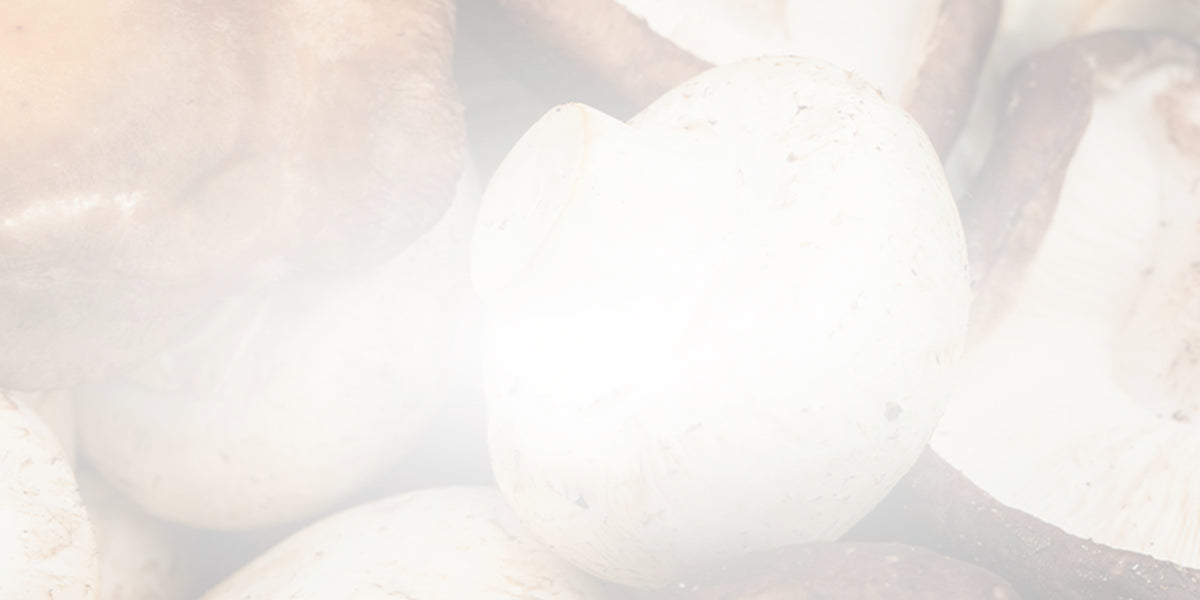
When looking to improve our health, it is common to want the best of the best. After all, what is the point of improving our health if we intend to cut corners? However, one constant word is thrown about for everything from the food on our table to the supplements we employ. "Organic."
There is still some debate about the benefit of organic mushrooms against regular as many are very set in their ways. So determining if purchasing organic products is worth the price tag is a bit of a challenge.
When it comes to getting supplements for high-value mushrooms like lion's mane, being aware of the benefits of organic over regular can be important, especially since everyone will have an opinion of their own when it comes to the debate. With this article, we hope to clarify whether organic mushrooms are worth the value they are sold for or a pointless expense.
What Does "Organic" Really Mean?
We should first cover what exactly is meant by "organic" produce over traditional produce.
Organic produce, as you might have guessed, is produce grown within the bounds of organic farming practices. Organic farming involves adjusting the techniques used by farmers and cultivators to minimize their ecological impact and the number of artificial chemicals used to produce their crops.
Organic farming saw a major overhaul in the 21st century after several countries, including the United States of America, Japan, the European Union, Mexico, and Canada, began requiring documentation to market products as "organic."
The United States, in particular, enacted the Organic Foods Production Act of 1990 that established federal regulations for the conditions of the farm producing organic produce. The OFPA specifies cultural, biological, and mechanical regulations that would preserve the biodiversity of the surrounding land. The United States even regulates the content of processed organic foods by requiring that the processed product is 95% comprised of organic ingredients and cannot contain artificial additives.

In the United States, there are currently four categories of products marketed as organic.
- 100% Organic: Each and every ingredient within must have been produced organically.
- Organic: This is where the 95% rule applies with an allowance of 5% non-organic ingredients.
- Made With Organic Ingredients: The product must be made up of at least 70% organic ingredients with a maximum allowance of 30% non-organic ingredients.
- Less Than 70% Organic Ingredients: Any product that falls below the 70% organic ingredient ratio must list three organic ingredients on the container label.
This categorization was done to ensure quality control for organic produce and guarantee that the products maximized the benefits of organically grown produce. The effort to produce organic products is not insignificant since the tools are heavily regulated. Organic products are meant to reduce the farmer's overall effect on the surrounding ecosystem and environment while preserving the integrity of the produce. So, the types of pesticides, fertilizer, and equipment are specially curated to do exactly that.
However, the question of whether this extra effort produces any genuine results in the actual produce they sell is ambiguous. No in-depth studies have been conducted to gauge the effects of an exclusively organic diet on the human body. That said, there might be some obvious reasons why organic produce is the better choice when compared to conventionally grown products.
Are there real benefits to organic mushrooms over mushrooms that lack the label? We think so.
Organic Mushrooms Have Fewer Pesticides
Virtually every farmer in the world makes use of some sort of pesticide. The reason is that insects, fungi, and other lifeforms will happily feed on produce well before it is meant to be harvested. So, to protect their livelihood, most farmers use pesticides to repel and kill these creatures before they can impair the produce.
Unfortunately, most pesticides are toxic to humans, making them something most of us are keen to avoid. It is unavoidable for any produce farmed with pesticides to be completely free of residue, so ensuring that the pesticides are used in moderation is vital for organic farming.
Given the threat that pests pose to crops, it is nearly impossible to avoid using pesticides entirely. However, a select few organic farmers might be able to pull it off. In the United States of America, the pesticides used in farming are curated and approved by the Environmental Protection Agency to ensure that no farmer uses pesticides that pose a health risk to consumers. Given the focus of organic farming to prevent damage to the surrounding environment as much as possible and minimize chemical concentrations in the produce, the pesticide use is a little more conservative.
The lesser concentration of pesticide residue in organically grown produce has been corroborated by a meta-analysis conducted back in 2012. The analysis found that 38% of conventionally grown produce retained pesticide residue. Conversely, only 7% of organically grown produce retained traces of pesticide residue. The same rates apply to organically grown mushrooms.

When it comes to pesticides, the most commonly employed is thiabendazole. While highly effective, too high a concentration of this compound can cause several symptoms, including dizziness, numbness, nausea, vomiting, diarrhea, fever, and blurred vision.
While it is not fatal and has low toxicity, the buildup is always dangerous. When it comes to mushrooms, 54.5% of conventionally grown samples from domestic farms have residue of thiabendazole. Likewise, 49.4% of conventionally grown mushrooms imported from foreign farms have the residue. For domestic and foreign mushrooms grown organically, 0% have had thiabendazole residue detected.
Organic Mushrooms Have Higher Concentrations of Phytochemicals
In addition to pesticides, crops and other produce yields are also known to have a concentration of phytochemicals. Ordinarily, these phytochemicals are natural defense mechanisms that plants use to fend off harmful lifeforms by themselves without intervention from pesticides. Phytochemicals can manufacture medicines and can even offer some nutritional benefits depending on the type. However, phytochemical production can be staggered when a plant or fungus is exposed to compounds like cadmium.
Many plants are exposed to cadmium in some capacity, with margins for error on exposure being a common concern. However, the way the produce is grown can directly affect the cadmium concentration found in produce and therefore improve the concentration of phytochemicals. An analysis conducted in 2014, similar to the one for pesticides conducted in 2012, evaluated the cadmium and polyphenol concentrations of produce grown in traditional means versus organically. The results found that organic produce had lower concentrations of cadmium and a 17% higher concentration of polyphenols than conventionally grown products.

Although not necessary for human health, the polyphenols that are ideally found in produce include phenolic acids, flavanones, stilbenes, flavones, flavonols, and anthocyanins. In organically grown produce, all polyphenols are elevated compared to conventionally grown examples of the same produce. This elevation is especially true for the flavanones, which have been documented to be 69% higher in concentration in organic produce.
Polyphenols are abundant in the fruiting bodies of mushrooms, which also happens to be the part we eat or refine. In fact, mushrooms have some of the highest concentrations of polyphenols out of all produce. So, an organically grown mushroom will have an extremely elevated polyphenol concentration over the conventionally grown types.
Unfortunately, this information does nothing to clear up some of the biggest red herrings associated with the debate over organic produce. So, let's dig into the myths relating to organic foods.
Clearing Up the Myths
Some people will claim that organically grown produce is more nutritious than conventionally grown. However, this might be something of an exaggeration. While organic produce will have a significantly lower concentration of pesticide residue, studies were conducted to determine if organic produce, mushrooms included, boasted a higher concentration of vitamins and nutrients.

In the bygone days of 2009, a review of organic produce found that they are no richer in vitamins and minerals than those grown conventionally. However, this same review did find that organic produce had lower concentrations of nitrogen than produce grown through traditional means. But, aside from that slight difference, the concentration of things like vitamin C, calcium, nitrates, sodium, and other compounds was not found to vary between them.
That said, given nitrogen's status as an anti-nutrient and more of a toxin, the lesser concentration in organic produce is worth capitalizing on. In excess, nitrogen can be toxic, but it is an inescapable byproduct of produce in general. Through organic cultivation, reducing the nitrogen level means minimizing health risks from nitrogen. However, by looking to organic mushrooms to try and boost your intake of vitamins and minerals, you will be setting yourself up for disappointment.
The Right Mushrooms Can Work Wonders
Mushrooms are extremely beneficial to anyone's diet, but certain mushrooms provide a more medicinal benefit. The odds are that, when you think of mushrooms, you think of the classic toadstool-shaped mushroom you find in salads, sautéed beside a steak, or even on a pizza. However, there are far more exotic mushrooms that, while edible, have found a higher calling in supplements.
Among these powerful forms of fungus is the lion's mane mushroom. Lion's mane could not be farther from the classic example of a mushroom in terms of appearance. It has a unique look that likely served as the origin of the name. It consists of several spines of around 1 to 5 cm in length that droop down with coloration ranging from white to brown depending on age. However, the truly astounding detail about lion's mane is its use as a nutritional and health supplement.

Lion's mane has shown promise in combating physical ailments like heart disease, diabetes, and digestive ulcers. Even when compared to other unique mushrooms, lion's mane has been shown to be highly beneficial. It also shows the potential for helping with less tangible issues like anxiety, depression, and even dementia.
With all of this benefit, finding lion's mane that has been grown organically could enhance the phytochemicals and other attributes of the mushroom that offer these many health benefits. At the very least, it will ensure that the concentration of pesticides and other harmful substances found in conventionally produced mushrooms is at a minimum. Regardless, the time has come to answer our ultimate question.
The Nu You
Organic versus conventional has been a topic of some debate for a long time. Many will swear by organic produce, whereas others will claim that there is no difference. While it is true that you will not see an increase in vitamins and nutrients when consuming organic over conventional produce, organic products have their advantages.

Organic products are showing more promise for refinement into medicinal supplements and the prevention of consuming toxins or pesticide residue. So, at the end of the day, there certainly are benefits to be enjoyed from consuming organic produce regularly. Occasionally, you might encounter the only genuine disadvantage organic products have: the price. However, even this isn't very important in the long run.
If you are looking to take advantage of mushrooms that offer medicinal benefits like the aforementioned lion's mane, organic might be the way to go. If you are interested, your next question is likely where you can acquire organic products that you can use. To that end, we at NuVitality would like to extend an invitation to peruse our catalog of supplements. We use organic lion's mane in our supplements that will allow you to enjoy all the mushroom benefits with all the benefits of organic cultivation. So let us accompany you on the journey to the Nu healthier you.
After reading today's article, do you have any questions or concerns about the use of mushrooms, the benefits of mushrooms, our organic lion's mane supplement, or anything similar? If so, please do not ever hesitate to reach out and contact us at any time! We understand that if you're entering the world of mushrooms for the first time, it can be a little confusing at points. We would be more than happy to assist you however we possibly can by answering those questions you may have and pointing you in the right direction.






